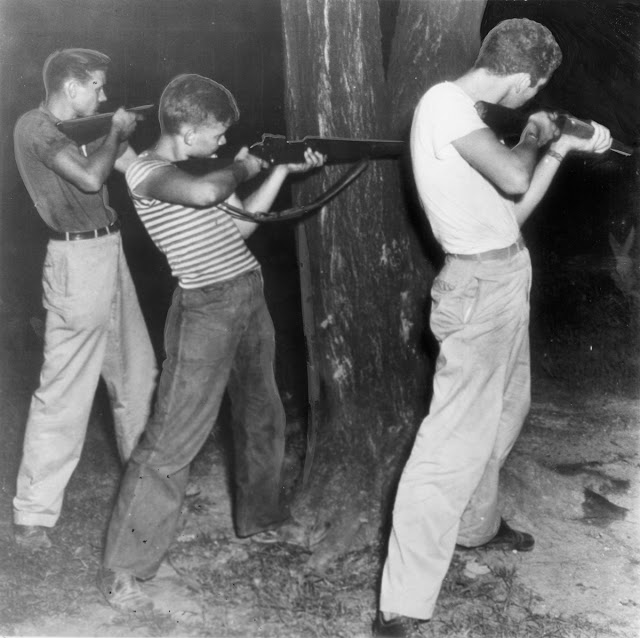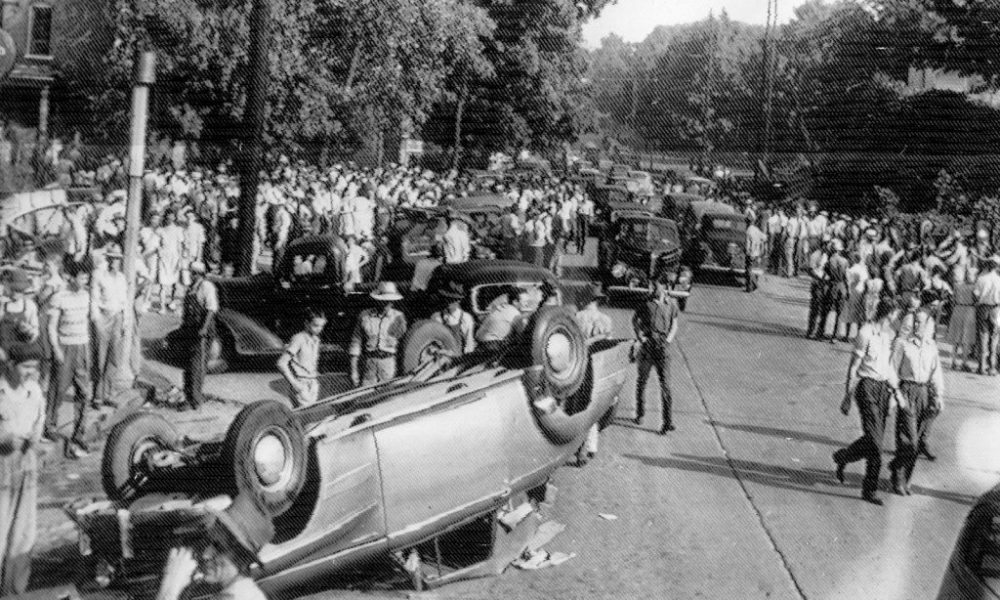The Battle of Athens
November 25, 2018
KYLE writes:
As calls for gun control accelerate, it’s important for Americans to learn about successful uses of the right to bear arms against tyrannical government. In 1946, in Athens, Tennessee, armed World War II veterans confronted a crooked political machine, and won. Known as the “Battle of Athens,” this episode perfectly illustrates the potential threat to liberty that the Founding Fathers foresaw when adding the Second Amendment to the U.S. Constitution.
Since the Civil War, McMinn County was a solid Republican county until Paul Cantrell, a wealthy southern Democrat, was elected sheriff in 1936. Cantrell closely associated his campaign with the Administration of Franklin D. Roosevelt, winning re-election for sheriff in 1938 and 1940 and then state senate in 1942 and 44. After becoming a senator, his former deputy, Pat Mansfield, took the reins of sheriff and continued the corrupt fee system by which money was generated from every arrest made by deputies in the county. The more arrests, the more money they made. The revenues were funneled into illegal gambling operations, and allegedly helped Cantrell and his cronies launder profits. The scheme became so bold that traveling buses passing through the city were stopped and passengers harassed and falsely arrested for public drunkenness.
“Deputies routinely boarded buses passing through and dragged sleepy-eyed passengers to the jail to pay their $16.50 fine for drunkenness, whether they were guilty or not. Arrests ran as high as 115 per weekend.” Seiber, L. (1985). The Battle Of Athens | AMERICAN HERITAGE. [online]
The political landscape of McMinn County changed further as Cantrell’s grip on the county tightened. Citizens suspected election fraud and reported their suspicions to the U.S. Justice Department in 1940, 42, and 44 to no avail.
“The 1940 election sent George Woods, a plump and affable Etowah crony of Cantrell, to the state legislature. Woods promptly introduced “An Act to Redistrict McMinn County.” It reduced the number of voting precincts from twenty-three to twelve and cut down the number of justices of the peace from fourteen to seven. Of these seven, four were openly Cantrell men. When Gov. Prentice Cooper signed Woods’s bill into law on February 15, 1941, effective Republican opposition died in McMinn County.” Seiber, L. (1985). The Battle Of Athens | AMERICAN HERITAGE. [online]
Over 3,000 combat veterans returned home to McMinn County in 1945, comprising 10% of the population. They became natural targets for the grifting scheme of Cantrell because they were young men who frequented local bars. The veterans decided to run their own candidate in the 1946 election on a non-partisan ticket with an independent group called the G.I. Non-Partisan League. Tensions between the citizens group and the local authorities would come to a head on election day, August 1, 1946.
The veterans were running their candidate for sheriff, Knox Henry, who had served in North Africa during the war, against Cantrell, who was seeking re-election (his crony Mansfield was running for senator). Sheriff Mansfield organized a posse of over 200 armed deputies to patrol the county on election day and create an intimidating presence. The deputies were placed at every voting station to be the first to grab ballot boxes as soon as the clock struck 4:00 pm and hurry off to the local jail to “count” the votes and steal the election.
Athens went into a state of panic after Cantrell’s deputies had an altercation with an elderly black farmer, Bill Gillespie, at the eleventh-precinct polling station located at the Athens Water Works. Racial comments were made and Gillespie was shot by a deputy and loaded into a cruiser. As the chaos ensued, two GI poll watchers were taken at gunpoint by deputies and held hostage at the Water Works where they would escape by diving out windows to join up with other veterans at the campaign headquarters.
As it became evident to the GIs that Cantrell’s men were willing to kill to retain power in McMinn County, they gathered to assess their options. Bill White, who fought in the Pacific, became angry and shouted at the other men to do the same:
“You call yourselves GIs—you go over there and fight for three and four years—you come back and you let a bunch of draft dodgers who stayed here where it was safe, and you were making it safe for them, push you around. … If you people don’t stop this, and now is the time and place, you people wouldn’t make a pimple on a fighting GI’s ass. Get guns…” Seiber, L. (1985). The Battle Of Athens | AMERICAN HERITAGE. [online]
A group of GIs organized and broke down the National Guard Armory doors, loaded up a truck with rifles and ammunition and proceeded towards the jailhouse where Paul Cantrell, Pat Mansfield, State Rep. George Woods, and about fifty deputies were stationed with the ballot boxes. A crowd of locals surrounded the jail and ordered the ballots brought to the street where they could be counted in the open. Cantrell refused and the GIs commenced to fire upon the jail in a firefight that lasted into the night.
The GIs were informed that the National Guard was on its way. Around 2:30 a.m., the men found dynamite in the county supply house and used it to breach the jailhouse. They found Cantrell’s men huddled on the floor in submission, ready to hand over the ballot boxes in defeat. The ballot count confirmed that Knox Henry and the other GI Non-Partisan League candidates had won.
The events of Athens quickly made national news with the New York Times covering the story, falsely claiming the sheriff had been shot down by the GIs. First Lady, Eleanor Roosevelt, wrote an op-ed on August 7, 1946 condemning the political machine of Cantrell that made such use of force necessary. In 1993, Hallmark produced a made-for-television film called “An American Story” that portrayed the events of the McMinn County War. Here is a clip of the jail shootout. (Violence warning)



